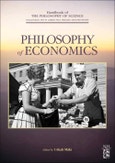Dov M. Gabbay King's College, London, UK; Paul Thagard University of Waterloo, Canada; and John Woods University of British Columbia, Canada.
Philosophy of Economics investigates the foundational concepts and methods of economics, the social science that analyzes the production, distribution and consumption of goods and services. This groundbreaking collection, the most thorough treatment of the philosophy of economics ever published, brings together philosophers, scientists and historians to map out the central topics in the field. The articles are divided into two groups. Chapters in the first group deal with various philosophical issues characteristic of economics in general, including realism and Lakatos, explanation and testing, modeling and mathematics, political ideology and feminist epistemology. Chapters in the second group discuss particular methods, theories and branches of economics, including forecasting and measurement, econometrics and experimentation, rational choice and agency issues, game theory and social choice, behavioral economics and public choice, geographical economics and evolutionary economics, and finally the economics of scientific knowledge. This volume serves as a detailed introduction for those new to the field as well as a rich source of new insights and potential research agendas for those already engaged with the philosophy of economics.
- Provides a bridge between philosophy and current scientific findings
- Encourages multi-disciplinary dialogue
- Covers theory and applications
Table of Contents
A. General Philosophical Themes Realism and Antirealism about Economics (Uskali Mäki) The Rise and Fall of Popper and Lakatos in Economics (Roger E. Backhouse) Models and Modelling in Economics (Mary S. Morgan and Tarja Knuuttila) Economic Theory and Causal Inference (Kevin D. Hoover) Naturalism and the Nature of Economic Evidence (Harold Kincaid) Some Issues Concerning the Nature of Economic Explanation (Harold Kincaid) The Unreasonable Efficacy of Mathematics in Economics (Philip Mirowski) Feminist Philosophy of Economics (Kristina Rolin) The Positive-Normative Dichotomy and Economics (D. Wade Hands) Economic Theory, Anti-economics, and Political Ideology (Don Ross) Social Scientific Naturalism and Experimentation in Economics (Daniel Hausman) B. Specific Methods, Theories, Approaches, Paradigms, Schools, Traditions The Philosophy of Economic Forecasting (Clive W. J. Granger) Philosophy of Econometrics (Aris Spanos) Measurement in Economics (Marcel Boumans) Geographical Economics and its NeighboursForces Towards and Against Unification (Caterina Marchionni) The Homo Economicus Conception of the Individual: An Ontological Approach (John B. Davis) Rational Choice and some Difficulties for Consequentialism (Paul Anand) Rational Choice: Preferences over Actions and Rule-following Behaviour (Viktor Vanberg) Philosophy of Game Theory (Till Grüne-Yanoff and Aki Lehtinen) An Embarrassment of Riches: Modeling Social Preferences in Ultimatum Games (Cristina Bicchieri and Jiji Zhang) Experimentation in Economics (Francesco Guala) Behavioral Economics (Erik Angner and George Loewenstein) The Economic Agent: Not Human, But Important (Don Ross) Ontological Issues in Evolutionary Economics: The Debate Between Generalized Darwinism and the Continuity Hypothesis (Jack Vromen) Public Choice
A Methodological Perspective (Hartmut Kliemt) Judgment Aggregation: A Short Introduction (Christian List) The Economics of Scientific Knowledge (Jesus Zamora Bonilla)
Author
Gabbay, Dov M.Thagard, Paul.
Woods, John.
M?ki, Uskali.








